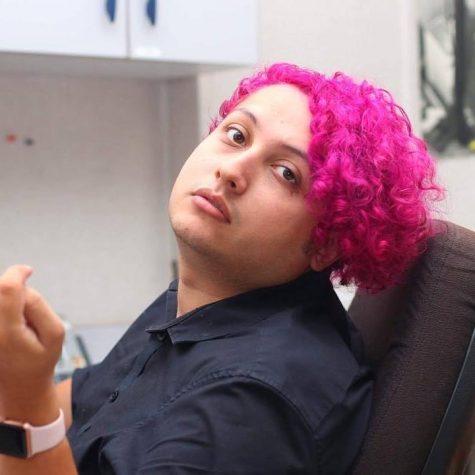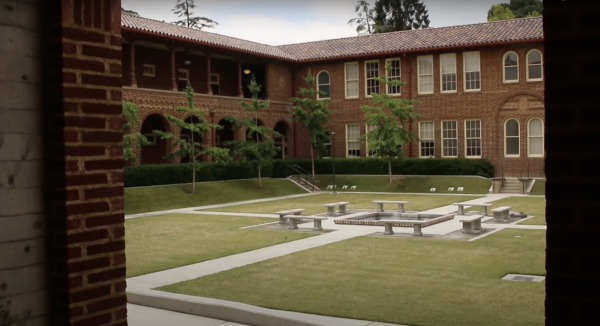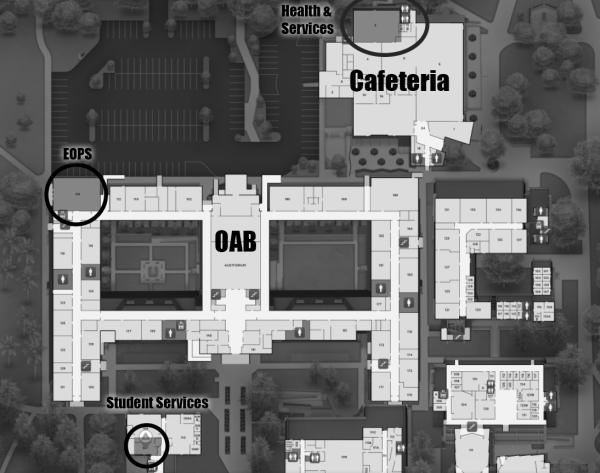Pushed Out? Facing Removal, ASG President Resigns
Photo by: Ram Reyes
Former ASG President Angela Van Gilder resigns after ethics board finds grounds for dismissal. Van Gilder was ASG president from Nov. 6, 2018 to Feb. 5.
A previous version of this article referred to the attempts to remove Angela Van Gilder from the vice presidency as potential Brown Act violations. Attempting to remove an ASG president or vice president without forming an ethics committee is actually in violation of the ASG constitution.
When now former ASG President Angela Van Gilder entered the senate chambers on Feb. 5, she didn’t expect to face an ethics hearing seeking to justify the body’s removal of her. Surprised, unprepared and fed up, she chose instead to resign.
“I thought this Tuesday we were voting whether or not to have a hearing,” Van Gilder said. At the last ASG meeting, the ethics committee found the complaints against Van Gilder credible, and gave the go ahead for a hearing and a vote for her removal from the presidency.
Van Gilder prepared for that eventuality. Extensive, color coded notes respond to each and every charge against her. Black text for the charges against her, blue for her justifications, and green for requests for more information.
But she anticipated one more vote and one more session before the hearing. She didn’t have her notes with her on Feb. 5.
“In a way, I kind of felt cheated,” Van Gilder said. She felt misled by Sean Henderson, dean of student services.
At the Jan. 29 ASG meeting, there was some confusion about the order of events; whether Van Gilder would have her chance to testify before the ethics committee voted to move ahead with a future removal vote or after. Henderson clarified that the board would decide whether or not the hearing and subsequent removal vote could happen, according to the minutes for the Jan. 29 meeting.
“They’re just saying that they see that there’s enough evidence from what people have brought to them for the charges that they’re going to present,” Van Gilder said. “They’re voting whether or not to accept the charges.”
She asked him if the Jan. 29 vote was just for the charges, then would the Feb. 5 vote approve a future hearing. “He replied with a simple yes,” Van Gilder said.
The Jan. 29 vote approved the charges so that a hearing could take place on Feb. 5. The ethics committee voted 6-1 yes, according to the minutes.
Van Gilder calls it a miscommunication. “I kept it very professional. I never accused him of anything.”
But Van Gilder argues that the minutes were provided by the communications officer at the last minute, just before the agenda was due, not giving her time to read them. The final agenda was not the one she had prepared and submitted, but one that was altered by ASG adviser Ernie Martinez. Her original agenda doesn’t include the vote to remove the president, the new one does, because the ethics committee voted 6-1 approving the hearing and the removal vote.
This wasn’t the first time Van Gilder was embattled as an ASG executive. She previously served as vice president under former ASG President Christopher Washington, who is serving a one-year jail sentence for dissuading a witness.
Prior to his arrest, Washington repeatedly tried to remove Van Gilder from the vice presidency, citing a “conflicting working environment.” The pair had a fraught relationship and even had a verbal altercation during an on-camera interview with the Rampage.
That video was significant in the charges against Van Gilder, according to the resolution detailing the allegations against her. One charge alleges that she “has been disrespectful in her interactions with the media, faculty, and fellow students […], leading to their differences being publicized in The Rampage, including a recorded interview conducted by a Rampage reporter.”
But with Washington gone, Van Gilder hoped for a clean slate. “He was the main person driving for my removal,” she said. “Nobody had thought of that until he pushed the whole idea.”
Van Gilder still isn’t sure why senators continued to seek her removal weeks after Washington’s tenure as president ended. After she became president and was sworn in, she assumed all was behind her, but conflict continued. “I would get dirty looks and be told, ‘Well, you’re not my mom,’” she said.
She frequently clashed with senators and advisors over Brown Act — legislation that regulates government proceedings even at the student level. Among the many charges against her are accusations that she failed to include votes for her removal from the vice presidency on the agenda. She argues that this is because the removal attempts were in violation of the constitution, as there was no ethics committee formed to approve a hearing or removal at the time.
For this latest removal attempt there was an ethics committee and substantial claims against Van Gilder. She was charged with failing to fulfill the responsibilities and duties of the ASG president, specifically, “To attend…ASG sponsored functions,” such as club rushes, the Fall Carnival, and Ram Slam.
“She wasn’t showing up for any of our functions,” said Carlos Rodriguez, student trustee, who also accused Van Gilder of failing to maintain her office hours.
Van Gilder maintains that she was kept out of the loop about events and that she was frequently told, when she was vice president, that her presence wasn’t needed. She said the events sometimes conflicted with her classes.

Angela Van Gilder and her service dog Sassy. Sassy was called “out of control” in a memorandum.
She was accused of behavior unbecoming of an ASG officer, “repeated and ongoing failure to perform promised obligations,” as well as, “excessive and willful behavior that is counterproductive to the goodwill and productivity of the ASG and student body.”
That charge is the result of a “verbal altercation” between Van Gilder and ASG adviser Ernie Martinez regarding another senator’s actions, which delayed a meeting. At the time of this writing, Martinez is at a conference and could not be reached for comment.
Rodriguez said that Van Gilder interfered with attempts to train new ASG senators. Van Gilder allegedly interrupted Henderson’s attempts to clarify ASG bylaws in a meeting when those clarifications seemed to turn into a full training.
“I can’t allow a full-on training to go on,” Van Gilder reportedly told Henderson. “It’s not listed in the agenda as an agenda item.”
“She thought she knew the Brown Act and Robert’s rules,” Rodriguez said. “It’s not against Brown or Robert’s rules to train. It doesn’t have to be on the agenda. [Henderson is] just there to make sure our meetings run smoothly.”
Van Gilder paints a different picture. She recalls a meeting between herself, Henderson, and Martinez, where Henderson confronted her with a memorandum about her conduct; it accused her of acting like a bully, accused her service dog Sassy of being out of control, and criticized her interpersonal conduct with ASG members.
“As he [Henderson] would read each one of them off I then went to give my response to it, and he literally told me I’m not allowed to speak,” Van Gilder said.
She said she tried to defend herself, her dog and her actions again.
“And he [Henderson] turned to advisor Martinez and said, ‘Haven’t I told her a few times now that she’s not allowed to speak and this is a one way conversation?’ And at that moment, I really did feel bullied,” she said.
Henderson disputes the account, but refused to go into details on the record because of confidentiality.
At the Feb. 5 ASG meeting, Van Gilder faced her removal hearing. She didn’t have her blue inked arguments. She felt ambushed by her dean, unsupported by her adviser, and rejected by her senate. She elected to resign.
She said she had too much respect for herself to continue working in an environment where she feels disrespected.
She left the room and Henderson followed. “And he told me I couldn’t just walk out like that and quit,” Van GIlder said. “And I said, ‘Actually I can. Anyone can resign at any time’.”

Tommy Tribble is the 25-year-old editor in chief of the Rampage, formerly the opinion editor. Tommy is an English major, a writer, an aspiring novelist,...

Ramuel Reyes is a 23-year-old, currently living in Fresno, California. He was born in Lucena City, Philippines. After living five years in the United Arab...









